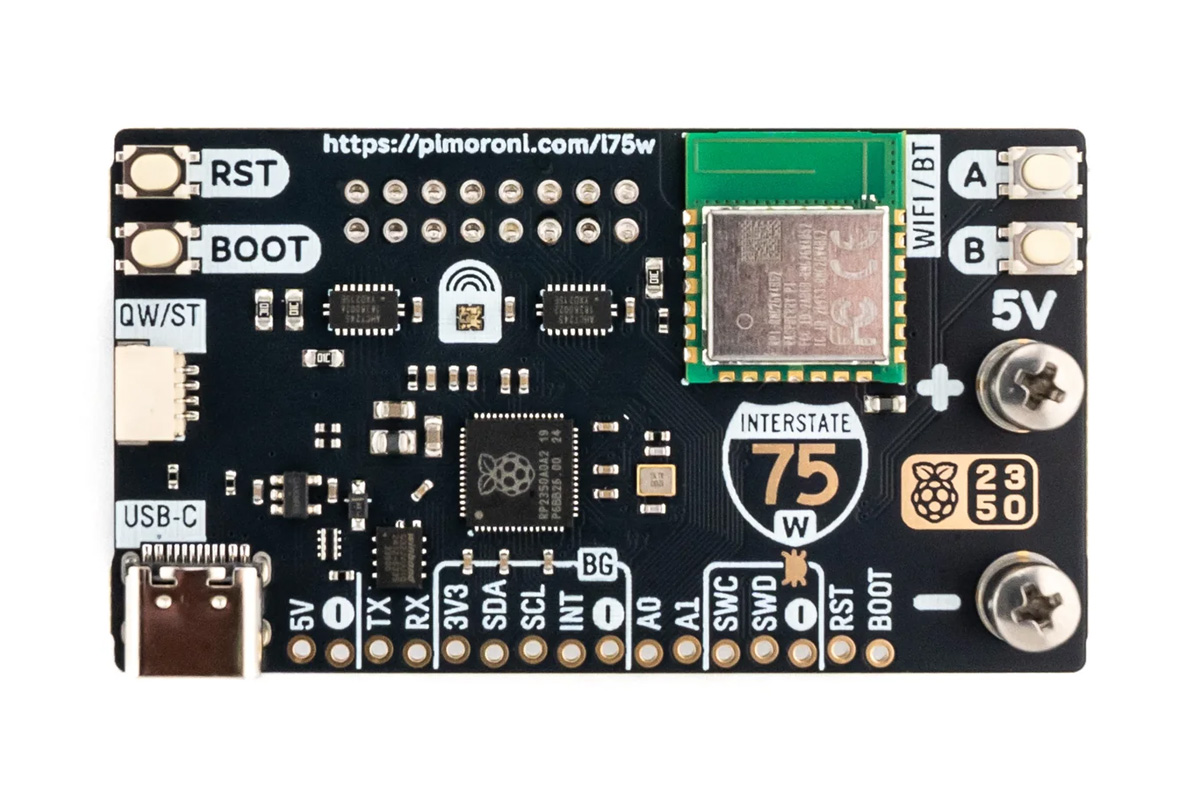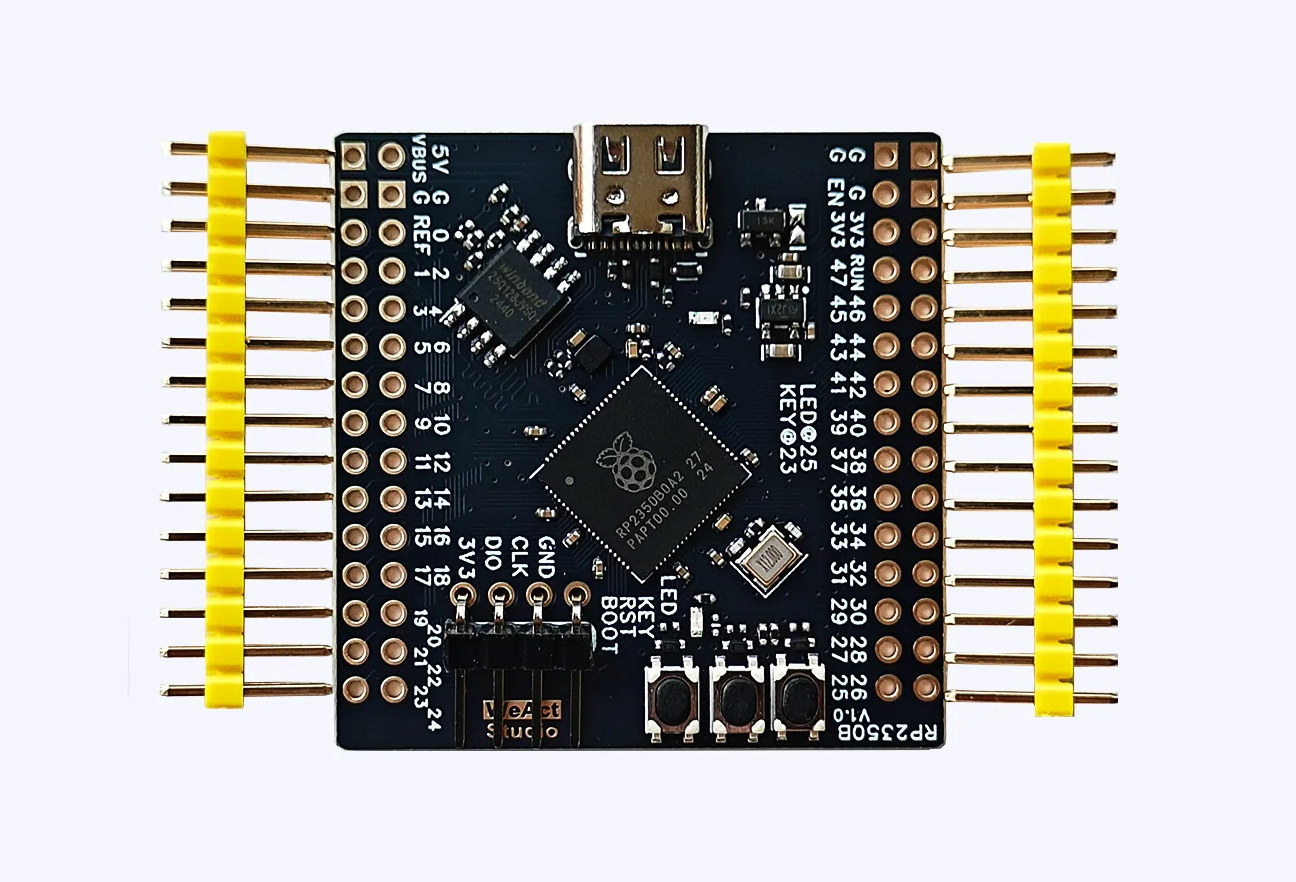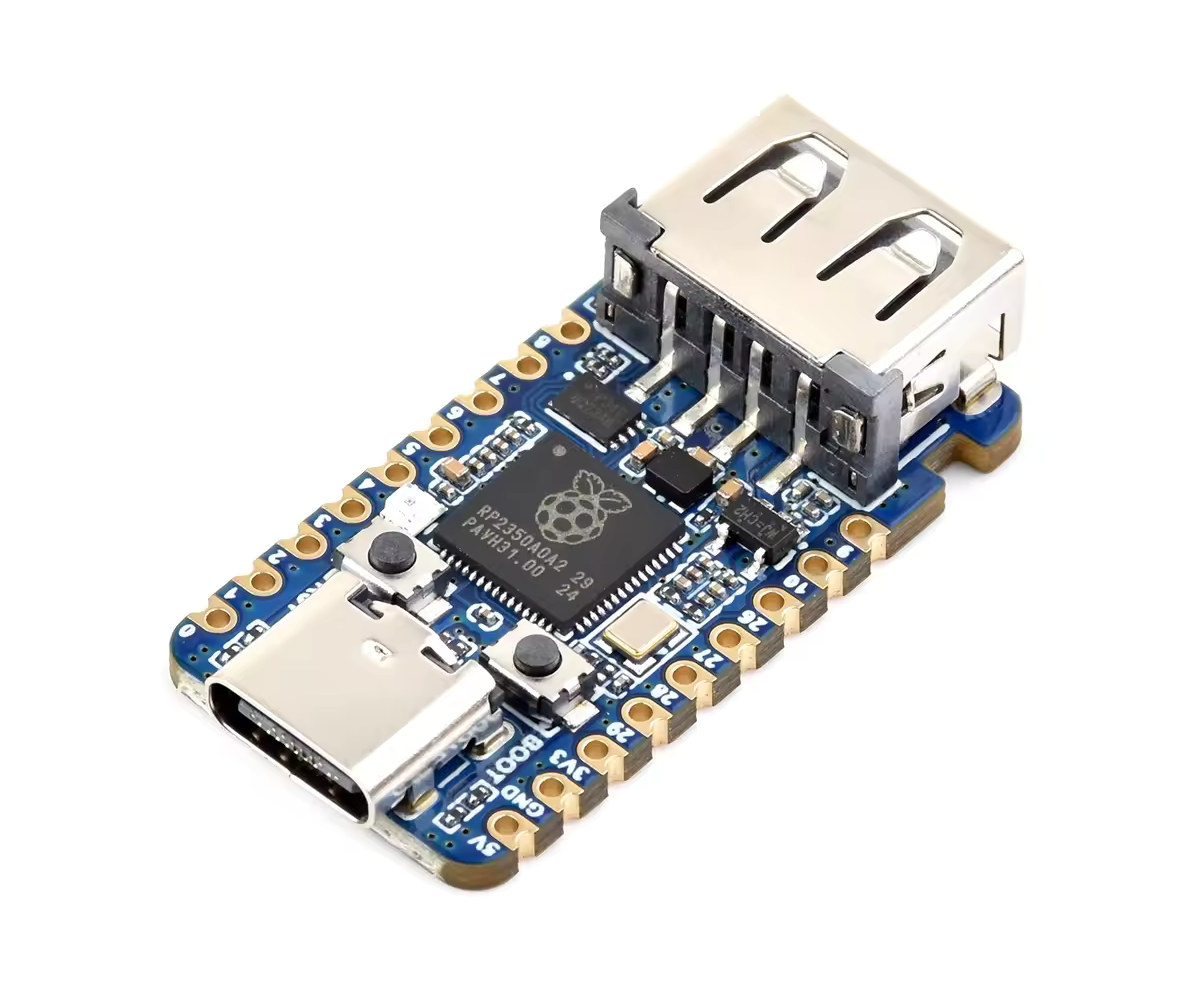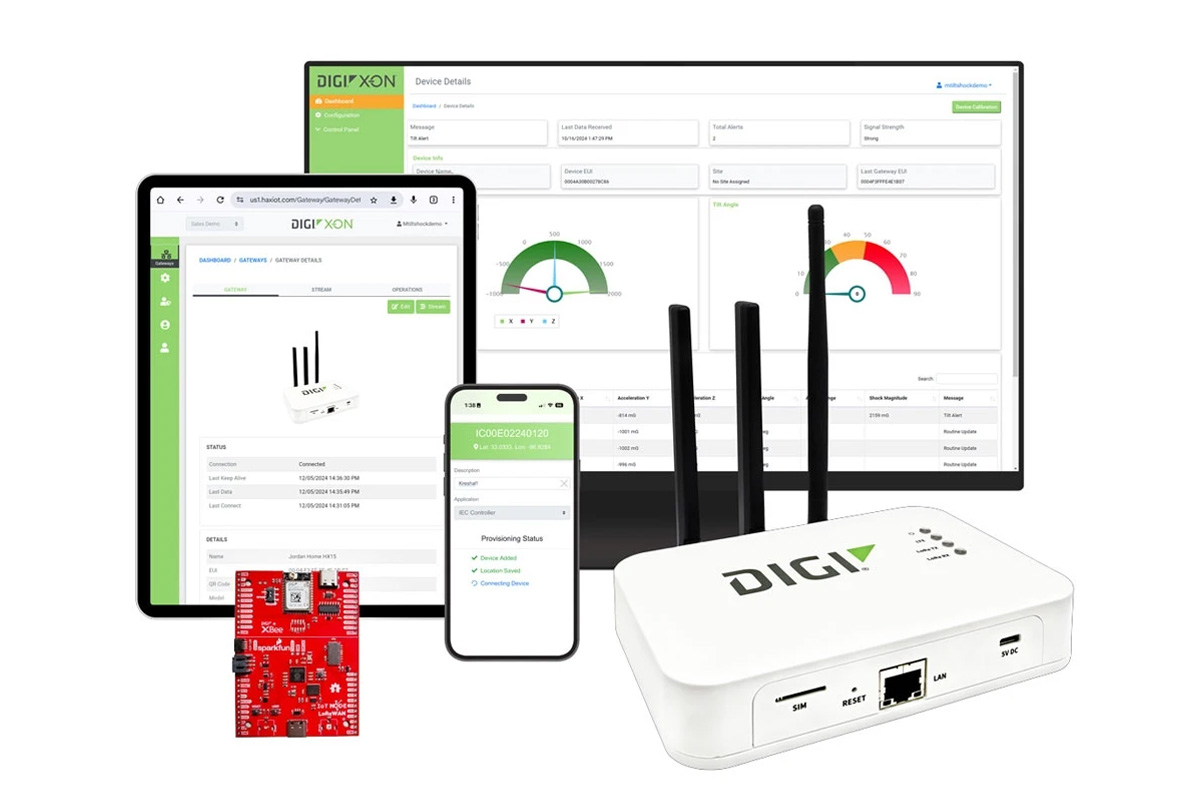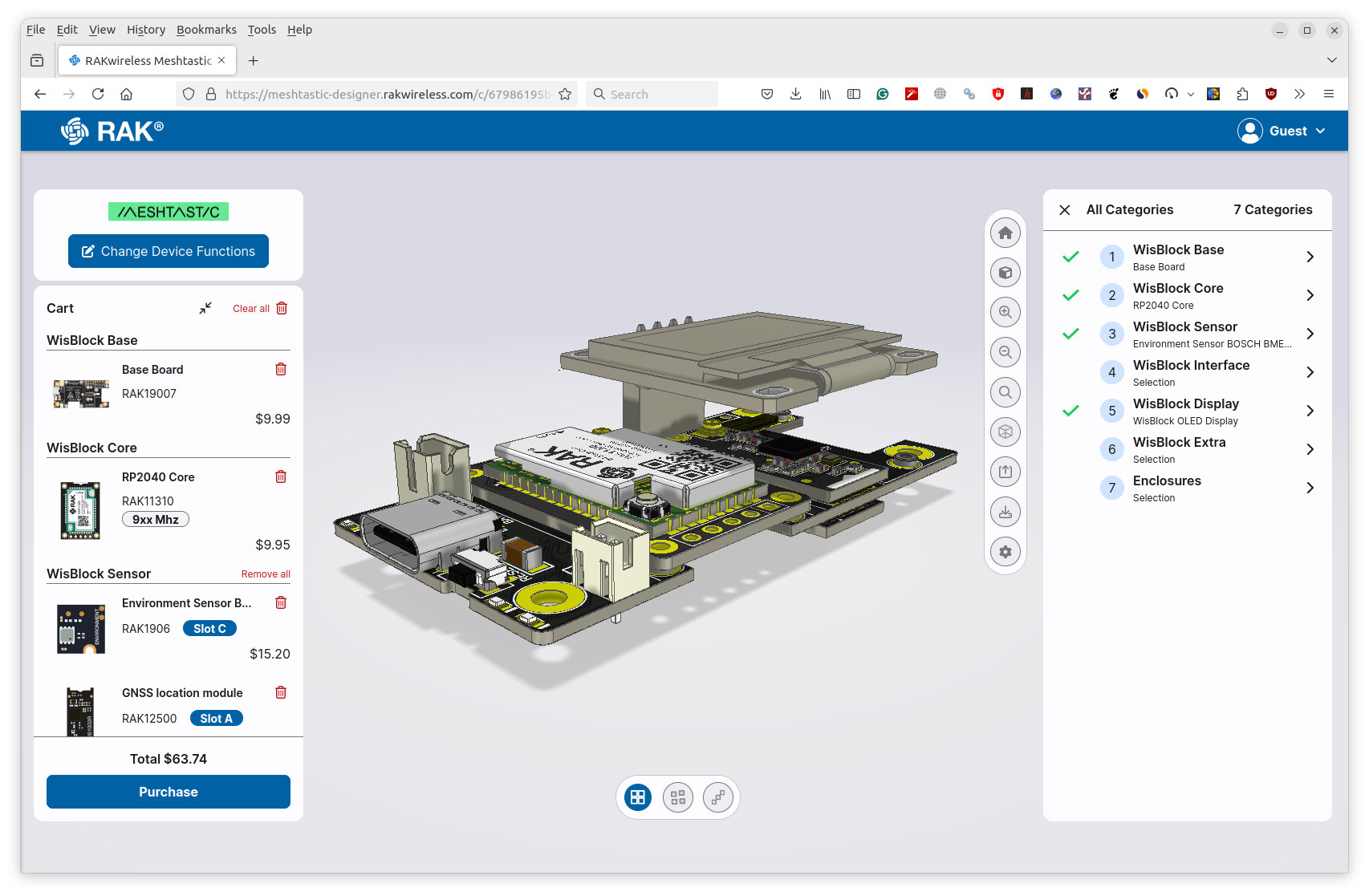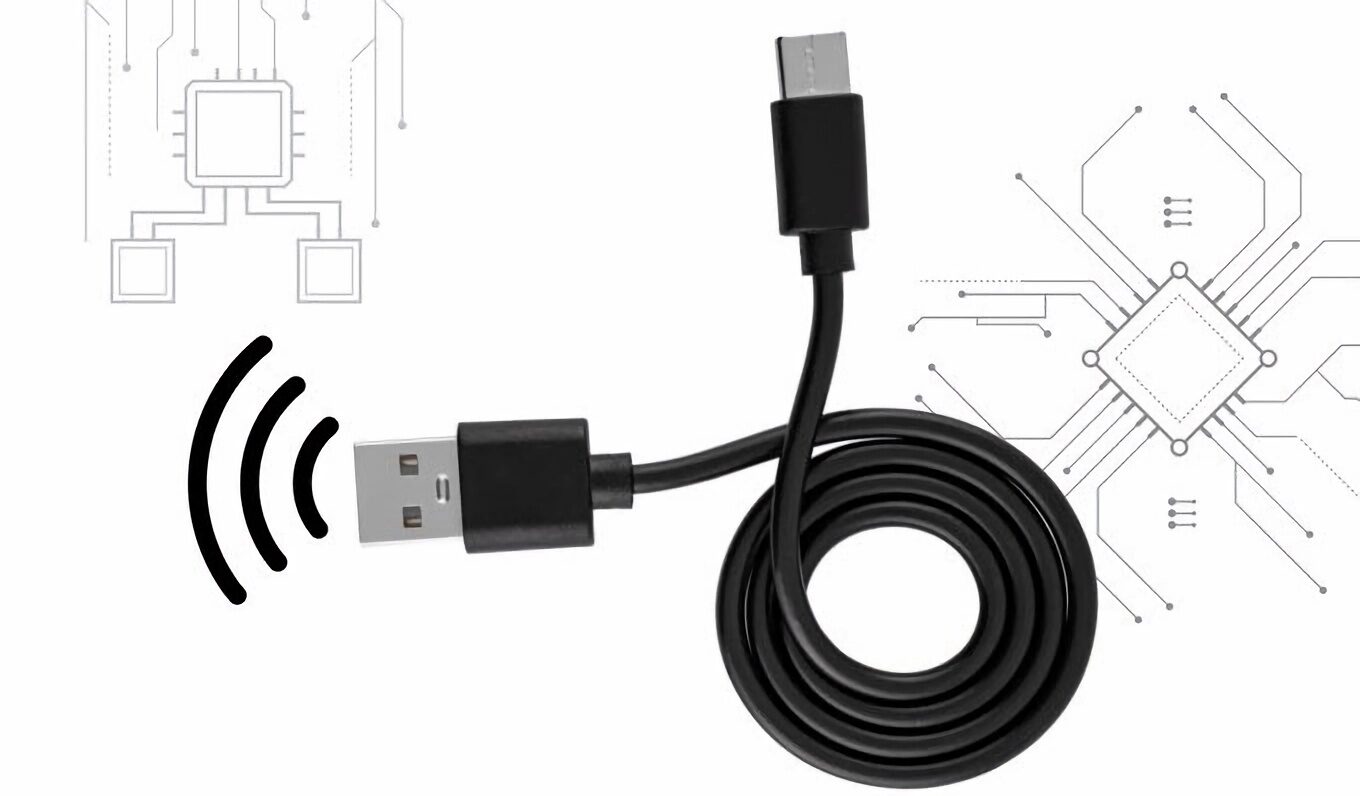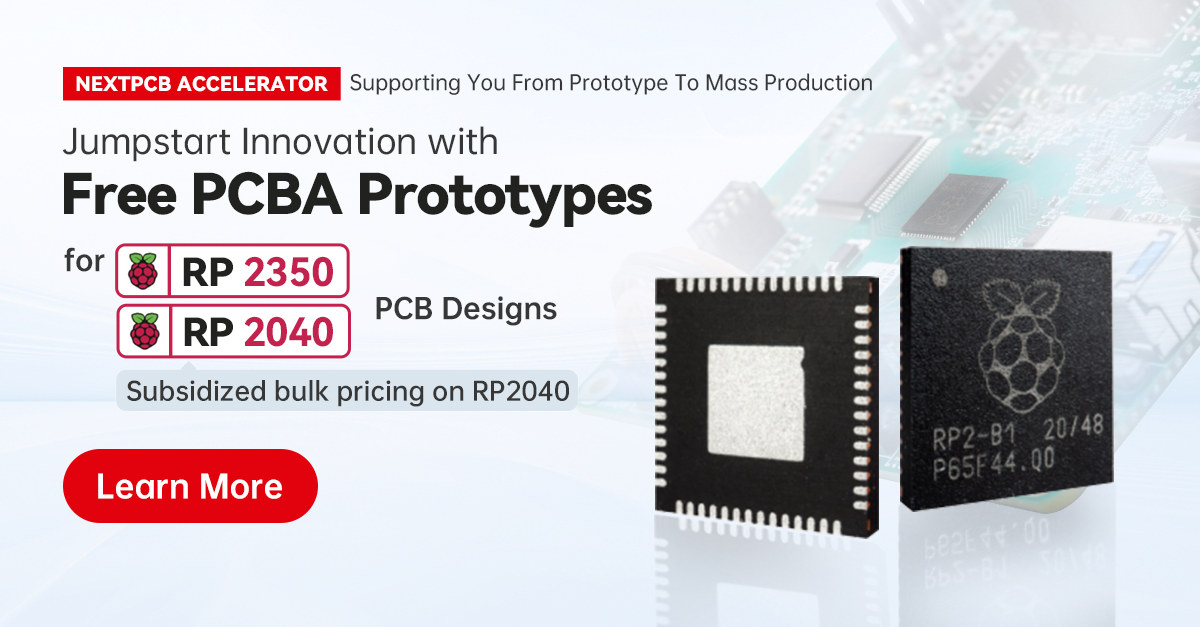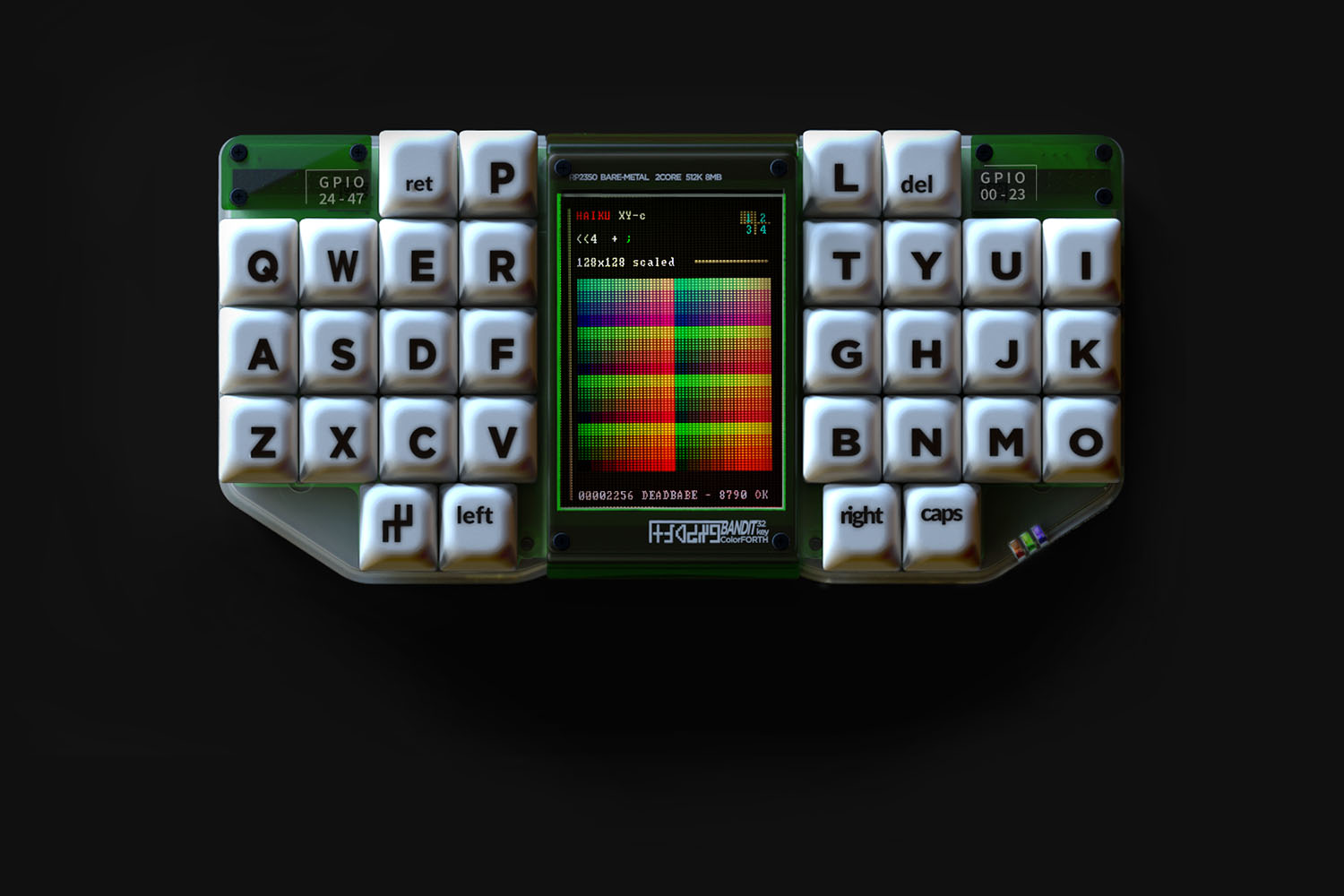Pimoroni Interstate 75 W (RP2350) is an all-in-one RGB LED matrix driver board designed for HUB75 LED matrix panels commonly used in video walls, advertising displays, and creative signage. Built around a Raspberry Pi RP2350 chip this board also uses the Raspberry Pi’s CYW43439 module for Wi-Fi and Bluetooth and features user buttons, an RGB LED, and a Qw/ST connector for integration with Qwiic/STEMMA QT breakouts. The kit is compatible with various LED matrix sizes (32×32, 64×64, etc.) and comes in a starter kit with panels, cables, and magnetic feet for quick setup. All these features make this kit useful for applications including real-time data like bus times, air quality, or sensor outputs, dynamic signage, scrolling text, and more. Pimoroni Interstate 75 W (RP2350) specifications: SoC – Raspberry Pi RP2350A CPU Dual-core Arm Cortex-M33 @ 150 MHz with Arm Trust zone, Secure boot OR Dual-core RISC-V Hazard3 @ 150 MHz Up […]
Tiny WeAct RP2350B Core Board exposes all 48 I/Os from the Raspberry Pi RP2350B microcontroller
WeAct RP2350B Core Board is a small (41.4×41.1mm) USB-C board exposing all 48 I/Os from the Raspberry Pi RP2350B Cortex-M33/RISC-V microcontroller through two 30-pin headers. It offers an alternative to the smaller Solder Party’s RP2350 Stamp XL (44.5 x 25.4 mm) with through and castellated holes and no USB-C port that’s better suited for soldering on a baseboard and to Olimex PICO2-XL and PICO2-XXL open-source hardware boards (50 x 28 mm). WeAct RP2350B Core Board specifications: Microcontroller – Raspberry Pi RP2350B MCU CPU – Dual-core Arm Cortex-M33 processor @ 150MHz Memory – 520KB internal RAM 8KB OTP Storage Package – QFN-80; 10×10 mm Storage 16MB QSPI flash Footprint for a second QSPI FLASH/PSRAM on the bottom side I/Os – All 48x GPIOs broken out via 2x 30-pin headers 2x UART, 2x SPI, 2x I2C 24x PWM 8x ADC 12x PIO state machines HSTX peripheral 5V, 3.3V, VREF, and GND Debugging […]
RP2350-USB-A – A Raspberry Pi RP2350 board with an extra USB Type-A port using a PIO implementation
Waveshare RP2350-USB-A is a small Raspberry Pi RP2350 board with a USB-C port for power and programming and a USB-A port to use the board as a USB device or host through a programmable IO (PIO) implementation. The board also features an RGB LED and two GPIO headers, which could make it useful for controlling GPIO/I2C/UART/SPI-connected devices when connected to a USB keypad or similar input. Alternatively, it could emulate a keyboard, mouse, or other USB device when connected to a host. RP2350-USB-A specifications: SoC – Raspberry Pi RP2350A MCU CPU Dual-core Arm Cortex-M33 @150MHz with Arm Trustzone Dual-core 32-bit Hazard3 RISC-V @ 150MHz Up to two cores can be used at the same time Memory – 520KB SRAM Storage – 2MB SPI flash for firmware USB USB Type-A port connected to GPIO12, GPIO13, 5V, and GND USB 1.1 Type-C port for power and programming Expansion – 2x 9-pin 2.54mm […]
SparkFun Digi X-ON LoRaWAN development kit combines Digi HX15 gateway with RP2350 IoT node and environmental sensors module
SparkFun has recently released the Digi X-ON LoRaWAN development kit an all-in-one IoT development kit designed to simplify the setup and deployment of LoRa-based IoT systems. It includes the Digi HX15 Gateway, SparkFun IoT Node for LoRaWAN, and the ENS160/BME280 environmental sensor, enabling rapid prototyping and connectivity with the help of the Digi X-ON cloud platform. The SparkFun IoT Node is built around the Raspberry Pi RP2350 microcontroller, which features 16MB flash, 8MB PSRAM, multiple GPIOs, LiPo battery support, microSD storage, and USB-C connectivity. It also integrates the Digi XBee LR module for long-range LoRaWAN communication with pre-activated cloud connectivity. With an onboard Qwiic connector and Arduino support, this development kit is ideal for applications like industrial monitoring, environmental sensing, smart agriculture, remote data collection, and more. Digi HX15 gateway specifications Microprocessor – STMicro STM32MP157C MPU with dual-core Cortex A7 @ 650 MHz, Cortex-M4 @ 209 MHz with FPU/MPU, 3D […]
Meshtastic Designer helps you build custom Meshtastic solutions with RAKwireless Wisblock components
RAKWireless introduced the Wisblock IoT Modular System in 2020 to let developers easily create LoRaWAN IoT solutions with various core modules, baseboards, and sensor/IO modules. The company kept adding new Wisblock modules year after year, and there are now over 120 modules part of the Wisblock ecosystem. While the large choice of modules makes designing IoT prototypes more flexible, customers often face challenges in checking compatibility and selecting the right modules for the right slots. That’s why RAKWireless has been working on web-based online designer tools for the Wisblock ecosystem. The first release is the Meshtastic Designer used to quickly configure and create their own Meshtastic devices from the module to enclosure, and place an order from there once the design is complete. I’ve given it a quick try myself. I wanted a Meshtastic device with a display, a keyboard, a GNSS module, and an air quality sensor since the […]
HackCable is a wireless-enabled, USB-C keystroke injection cable powered by ESP32 or RP2040 (Crowdfunding)
HackCable is a wireless-enabled USB-C keystroke injection cable described as the “ultimate tool for cybersecurity enthusiasts and ethical hackers.” powered by the ESP32-S3 or the Raspberry Pi RP2040. The ESP32-S3 version is described as the Wi-Fi Version and offers a built-in Wi-Fi hotspot, remote operation, and master-slave configuration for multiple cables. The Normal Version is a cheaper variant powered by the Raspberry Pi RP2040 microcontroller and built for focused, offline tasks where wireless control isn’t needed. The HackCable promises hardware keylogging, remote control, and master-slave synchronization for multiple cables. We have covered other USB penetration testing tools like the Diabolic Drive and Pendrive S3, but those were USB dongles while the HackCable looks like a standard USB Type-A to USB Type-C cable. There is very little information about the product, other than the microcontrollers that power it. It is likely running SuperWiFiDuck or some other USB rubber ducky program. It […]
NextPCB offers free PCBA prototypes for RP2350/RP2040 designs, RP2040 MCU as low as 30 cents (Sponsored)
NextPCB Accelerator is an initiative from the PCB and PCBA manufacturer to empower innovators and creators to bring their ideas to life, and the ongoing campaign features the Raspberry Pi RP2350 and RP2040 microcontrollers. Specifically, NextPCB offers two free PCBA prototypes for any original design based on either the RP2350 Cortex-M33/RISC-V microcontroller or RP2040 Arm Cortex-M0+ MCU from Raspberry Pi. The company also offers subsidized bulk pricing for the Raspberry Pi RP2040 for any company or maker mass-producing their design with NextPCB. Besides PCB manufacturing, NextPCB will offer professional assembly of the RP2040 or RP2350 chips using their precision pick-and-place machines, advanced automated inspection equipment, and carefully controlled manufacturing practices. NextPCB’s IC programming and firmware burning services will free up time for customers, and functional testing services will make sure all prototypes are tested for functionality before leaving the production line. The conditions of the offer are pretty straightforward. NextPCB […]
BANDIT PC32 standalone ColorForth keyboard computer is powered by the Raspberry Pi RP2350 microcontroller
BANDIT PC32 is a Raspberry Pi RP2350-powered keyboard computer that runs a graphically-oriented version of the ColorForth programming environment. The BANDIT PC32 is primarily aimed at on-the-go use for programming video games. The custom, 32-key split keyboard takes up most of the build, with a 3.2-inch 320 x 240 capacitive display in the center. It also features an HDMI port for connecting a larger external display. The 48-pin GPIO is divided into two female headers and can be used to interface with other devices directly. This is the second version of the Bandit standalone computer, building on an early prototype based on the RP2040 microcontroller. We have seen several interesting RP2350-based products like the Inky Frame 7.3”, 4D Systems display modules, and Jumperless V5 programmable breadboard. However, this is the first RP2350 standalone computer we have come across. It shares some similarities with the ESP32 Rainbow. BANDIT PC32 ColorForth specifications: […]


